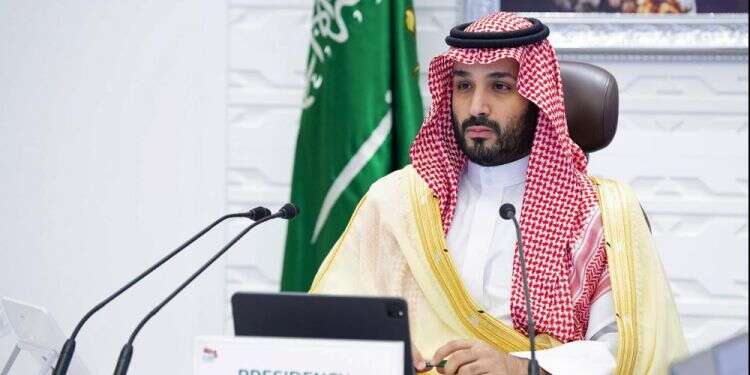In a significant shift in Middle East dynamics, Saudi Arabia is reportedly seeking a defense alliance similar to Israel's, while Gulf states position themselves to play a crucial role in resolving the Gaza crisis. This development unfolds against a backdrop of regional tensions, including concerns along the Israel-Lebanon border, uncertainty in United States politics, and ongoing turmoil in Israel's political landscape, according to a high-ranking Gulf official.
"Currently, we're all in a holding pattern," the official confided this week to Israel Hayom. "We're closely monitoring the Israel-Lebanon border, wary of potential conflict escalation. We're also navigating the uncertainties within the US administration, the upcoming presidential elections, and the political instability in Israel. Nevertheless, there's a consensus that the leading Gulf nations will inevitably be integral to resolving the Gaza situation, as part of a broader regional arrangement that includes expanded normalization with Israel."
When pressed on who constitutes "we all," the official elaborated, "This encompasses the leadership of moderate Gulf states, Egypt, Jordan, and the Israeli leadership – extending beyond just Prime Minister [Benjamin] Netanyahu."
The official further explained, "Netanyahu, as a seasoned statesman, recognizes this as the solution and the sole means to extract a positive outcome for Israel from this devastating conflict. However, he's struggling to make progress. It's possible he's hesitant to move forward due to Israel's internal political dynamics. Our assessment is that this will ultimately materialize through collaboration with additional leaders who maintain regular communication with us."
The term "Gulf countries" is diplomatic shorthand primarily referring to Saudi Arabia, the de facto leader of the moderate Sunni world, which has repeatedly neared the brink of formalizing an agreement with Israel. It also encompasses the United Arab Emirates and Bahrain, signatories to the Abraham Accords with Israel.
A prevailing diplomatic interpretation suggests that the Oct. 7 Hamas onslaught was partially aimed at derailing this prospective agreement, which would have granted Saudi Arabia a regional defense alliance, primarily with the United States, but also with Israel – a nation the Saudis increasingly trust.
Faced with Iran's expanding influence and the Houthi threat in Yemen, Saudi Arabia is compelled to seek new alliances and support. For instance, they've sought China's assistance in mitigating Houthi threats to vessels departing their ports.
Crown Prince Mohammed bin Salman's strategic priority remains the establishment of a defense alliance against Iran and its proxies, which is already partially operational. Having witnessed the international support Israel received during Iran's April attack, the Saudis aspire to secure similar formal backing. To this end, they're willing to contribute to Gaza's reconstruction post-conflict, but only in the absence of Hamas influence. Some reports suggest they might even join the UAE in providing a peacekeeping force in Gaza.
Several factors are impeding progress toward Saudi-Israeli normalization. Primarily, it's contingent on the conclusion of the Gaza conflict. This partly explains US pressure on Israel to end hostilities – securing a diplomatic victory before the upcoming elections.
Disagreements over the Palestinian issue present another obstacle. While the Saudis demonstrate flexibility, accepting a general commitment from Israel to advance conflict resolution with Palestinian leadership, the US insists on explicit steps towards Palestinian statehood.
According to diplomatic sources, Netanyahu currently resists any commitments on the Palestinian front, despite pressure from centrist leaders like Benny Gantz and Gadi Eizenkot during their tenure in government.
The Saudi request for a civilian nuclear reactor presents an additional complication, facing widespread opposition within Israel's security establishment and uncertain support from the prime minister's office.
Given these complexities, coupled with the ongoing Gaza conflict, potential escalation with Hezbollah, and the US election cycle, full normalization with Saudi Arabia may be deferred until 2025. However, Saudi involvement in a civilian solution for Gaza, even indirectly, remains a possibility in the nearer term.




